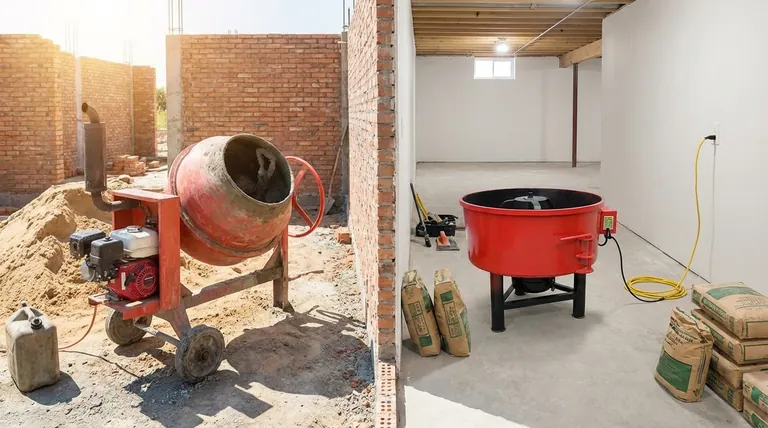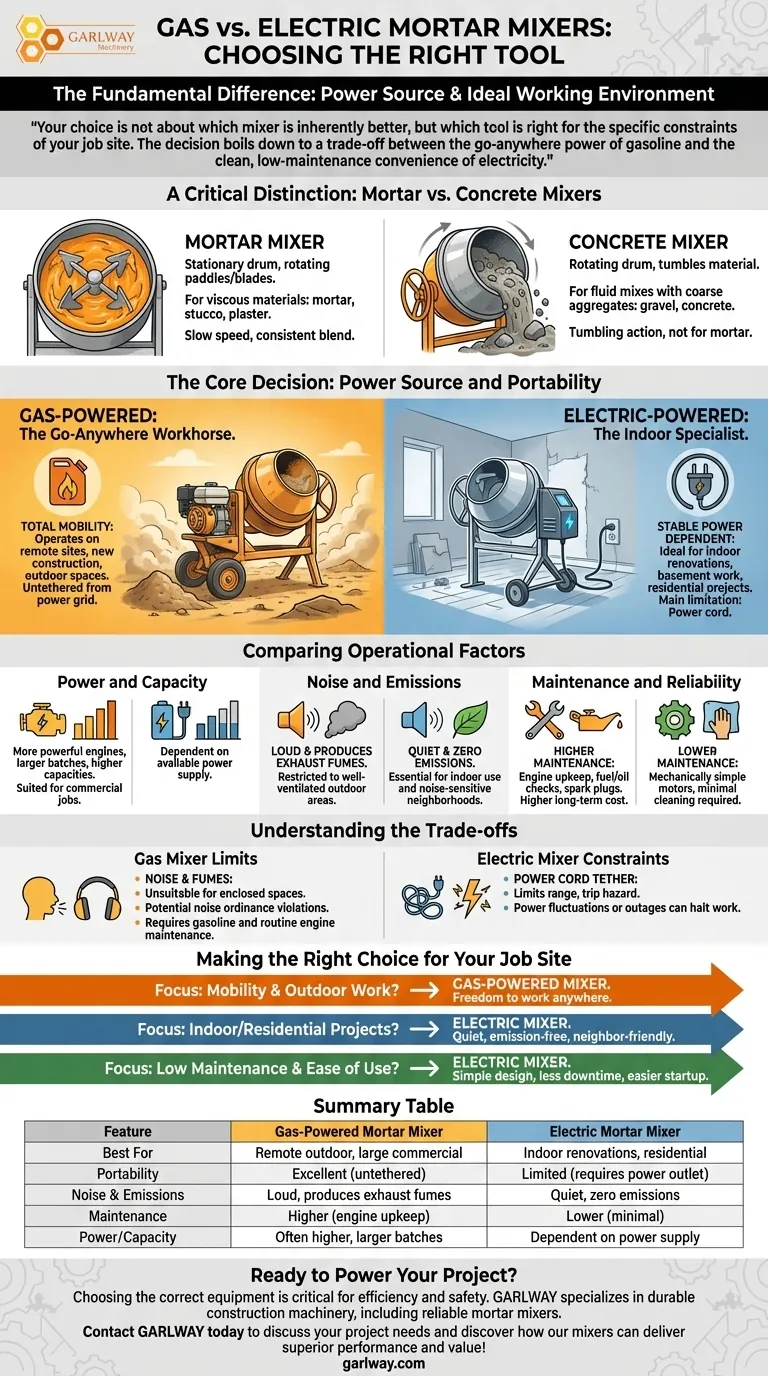The fundamental difference between gas and electric mortar mixers lies in their power source, which dictates their ideal working environment. Gas-powered mixers offer complete portability for any job site, while electric mixers provide quiet, emission-free operation perfect for indoor or residential areas with access to power.
Your choice is not about which mixer is inherently better, but which tool is right for the specific constraints of your job site. The decision boils down to a trade-off between the go-anywhere power of gasoline and the clean, low-maintenance convenience of electricity.

First, A Critical Distinction: Mortar vs. Concrete Mixers
Before comparing power types, it's crucial to understand what makes a mortar mixer unique. People often use the terms interchangeably, but these are fundamentally different tools designed for different materials.
How a Mortar Mixer Works
A mortar mixer is designed for heavy, viscous materials like mortar, stucco, or plaster. It uses a stationary drum or tank. Inside, a set of rotating paddles or star-shaped blades churns the material at a relatively slow speed, ensuring a consistent, well-blended mixture.
The Concrete Mixer Difference
A concrete mixer, in contrast, is built for more fluid mixes containing coarse aggregates like gravel. It uses a rotating drum that tumbles the material. This tumbling action is efficient for concrete but is not effective for the sticky consistency of mortar.
The Core Decision: Power Source and Portability
Your primary consideration will be where you plan to do the work. The power source is the single biggest factor separating these two types of mixers.
Gas-Powered: The Go-Anywhere Workhorse
The key advantage of a gas mixer is total mobility. It can operate on any remote job site, new construction area, or outdoor space without needing access to a power grid. You are completely untethered from extension cords.
Electric-Powered: The Indoor Specialist
An electric mixer depends on a stable power outlet. This makes it the ideal choice for indoor renovations, basement work, or any residential project where power is readily available. The power cord is its main limitation.
Comparing Operational Factors
Beyond portability, the power source impacts noise, emissions, maintenance, and even the scale of work each mixer is suited for.
Power and Capacity
Gas-powered mixers often have more powerful engines, allowing them to handle larger batches and potentially higher capacities. This makes them well-suited for larger commercial masonry jobs.
Noise and Emissions
This is a clear dividing line. Electric mixers are quiet and produce zero emissions, making them essential for indoor use and preferable in noise-sensitive residential neighborhoods. Gas engines are loud and produce exhaust fumes, restricting them to well-ventilated outdoor areas.
Maintenance and Reliability
Electric motors are mechanically simple, requiring very little maintenance beyond basic cleaning. Gas engines demand more upkeep, including regular checks on fuel, oil, and spark plugs, adding to their long-term operational cost.
Understanding the Trade-offs
Neither option is perfect for every scenario. Acknowledging their limitations is key to avoiding frustration on the job.
The Limits of Gas Mixers
The primary drawbacks of gas mixers are noise and fumes. They are unsuitable for enclosed spaces and can violate local noise ordinances. They also require you to have gasoline on hand and perform routine engine maintenance.
The Constraints of Electric Mixers
An electric mixer is completely dependent on its power cord. This tethers you to a power source, limits your range, and can introduce a trip hazard on a busy worksite. Power fluctuations or outages can bring work to a halt.
Making the Right Choice for Your Job Site
To select the correct mixer, simply match its strengths to the demands of your project environment.
- If your primary focus is mobility and outdoor work: A gas-powered mixer offers the freedom you need to work anywhere without constraints.
- If your primary focus is indoor or residential projects: An electric mixer is the clear choice for its quiet, emission-free, and neighbor-friendly operation.
- If your primary focus is low maintenance and ease of use: An electric mixer's simple design means less downtime and easier startup.
By aligning the mixer's power source with your worksite's reality, you ensure maximum efficiency and safety for your project.
Summary Table:
| Feature | Gas-Powered Mortar Mixer | Electric Mortar Mixer |
|---|---|---|
| Best For | Remote outdoor job sites, large commercial projects | Indoor renovations, residential areas, noise-sensitive zones |
| Portability | Excellent (untethered) | Limited (requires power outlet) |
| Noise & Emissions | Loud, produces exhaust fumes | Quiet, zero emissions |
| Maintenance | Higher (engine upkeep required) | Lower (minimal maintenance) |
| Power/Capacity | Often higher, suitable for larger batches | Dependent on available power supply |
Ready to Power Your Project with the Right Mortar Mixer?
Choosing the correct equipment is critical for efficiency and safety on your job site. At GARLWAY, we specialize in durable construction machinery, including reliable mortar mixers designed for the demands of professional contractors and construction companies.
Let us help you select the perfect mixer—whether you need the go-anywhere power of gas or the clean, quiet operation of electric.
Contact GARLWAY today to discuss your project needs and discover how our mixers can deliver superior performance and value!
Visual Guide

Related Products
- Portable Concrete Mixer Machine Equipment for Mixing Concrete
- Commercial Electric Concrete Mixer Machine HZS 50 Small Batch Plant for Sale
- Ready Mixer Machine for Construction Ready Mix Machinery
- Hydraulic Concrete Mixer Machine Cement Mixing Equipment for Mixture Concrete
- HZS25 Best Cement Mixer for Quick Mix Concrete at Bunnings
People Also Ask
- How long does it take to mix concrete in a portable mixer? Master the 60-Minute Rule
- What are the components of concrete mixing? Master the Ingredients and Machinery for Perfect Results
- How much does a portable concrete mixer hold? A Guide to Choosing the Right Capacity
- How much concrete can you pour with a portable mixer? Find the Perfect Fit for Your Project
- What are the factors influencing choice of a concrete mixing plant? Key Considerations for Efficiency

















